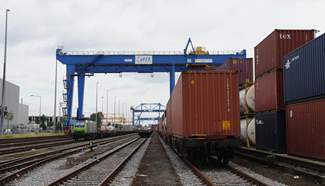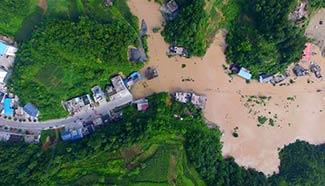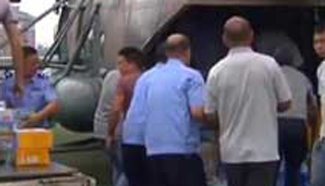SAN FRANCISCO, July 21 (Xinhua) -- Facebook Inc. has completed the first full-scale test flight of Aquila, a high-altitude unmanned aircraft designed to relay Internet access in the world's remote areas, the company said Thursday.
The online social networking service based in Menlo Park, northern California, said that the 96-minute test flight on June 28 over the Yuma Proving Ground in Yuma, Arizona, was the first functional check of the solar-powered drone.
Mark Zuckerberg, Facebook's chief executive officer, was at the site to see the flight.
At an altitude of 655 meters above sea level, Aquila and its four engines consumed 2,000 watts of power, equivalent to that of a hair dryer.
With its unique design and carbon-fiber frame, and wings made from a cured carbon fiber stronger than steel or the same mass of material, the 409 kg drone has a wingspan of 43 meters, wider than that of a Boeing 737 passenger plane.
Jay Parikh, global head of engineering and infrastructure at Facebook, said in a post on the company's website that engineers had been flying a one-fifth scale version of Aquila for several months and were able to verify several performance models and components, including aerodynamics, batteries, control systems and crew training, in the June 28 test flight.
When deployed, Aquila is supposed to circle a region of up to 97 kms in diameter for up to three months at a time, beaming Internet connectivity down using laser communications and millimeter wave systems from an altitude of between 18,290 and 27,430 meters, above commercial air traffic.
Developed by Facebook's Connectivity Lab, which embraces aerospace, mechanical and software engineers, designers and logistics specialists,Aquila will be part of a fleet of Internet access relay aircraft and fly on solar power during the day and battery power at night.
At a cruising speed less than 129 kms per hour, it will use some 5,000 watts of power, about as much as three hair dryers or a high-end microwave. Its batteries must supply that load for a long winter night, up to 13 or 14 hours.
The Connectivity Lab team has designed and lab-tested a laser that can deliver data at a speed some 10 times faster than the previous state-of-the-art to a target the size of a 10 U.S. cents coin from more than 16 kms away.
The fleet of drones, according to Facebook's vision, will be a more cost-effective way than the conventional approach to delivering Internet access to about 1.6 billion people in remote locations worldwide.
However, Parikh said that "failures are expected and sometimes even planned" as the team "will need to break the world record for solar-powered unmanned flight, which currently stands at two weeks."
It "will require significant advancements in science and engineering to achieve," Parikh added.










